Visa repression puts these rural doctors in danger

During his pediatrication practice in Sioux Falls, in southern Dakota, Dr. Alaa Al Nofal sees up to 10 patients per day. He knows some since their birth. Others, he still deals after obtaining his graduate of high school.
“I treat these children for type 1 diabetes, thyroid problems, thyroid cancer, puberty disorders and adrenal gland disease,” he said.
The expertise of Al Nofal is essential. He is one of the five full -time pediatric endocrinologists in an area of 150,000 square miles which covers the southern and northern Dakota.
Like most rural America, it is a region plagued by a shortage of doctors.
“We are very lucky to have Dr. Al Nofal here. We cannot afford to lose someone with their specialization,” said Cindy Morrison, marketing director for Sanford Health, a non -profit health care system based in Sioux Falls which manages 300 hospitals and clinics in rural predominance communities.
Related: the visa ban could make the doctor's shortage in rural America still worse
However, Sanford Health can lose Al Nofal and several other crucial doctors for his health care network.
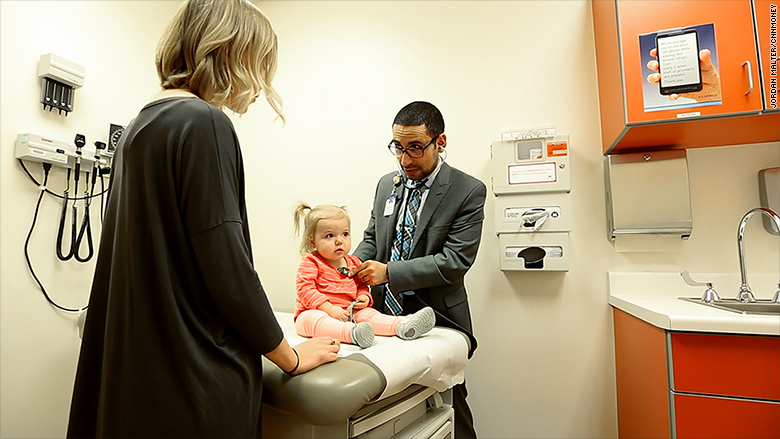
A Syrian citizen, Al Nofal is in Sioux Falls through a special workforce for the workforce of the workforce called the derogation of Visa Conrad 30-which essentially renounces the requirement that doctors who finish their residence on a visa by visitor to exchange J-1 must return to their country of origin for two years before requesting another American visa. The derogation from Conrad 30 allows him to stay in the United States for a maximum of three years as long as he undertakes to practice in an area where there is a shortage of doctors.
After President Donald Trump published a temporary immigration ban Restoring people from seven Muslim majority countries – including Syria – from entry to the United States, Al Nofal is not sure of its future in America.
“We agree that something more must be done to protect the country, but this decree will have a negative effect on the doctors of these countries which are very necessary through America,” said Al Nofal. “They may no longer want to practice in the United States.” The action is currently in legal limbo after a federal court of appeal temporarily arrested The ban.
Related: Furious Trump after the court supports the ban on travel
Over the past 15 years, renunciation of the Conrad 30 visa Channel 15,000 foreign doctors in poorly served communities.
Sanford Health has 75 doctors in total on these visa derogations and seven come from the countries listed in the decree. “If we lost Dr. Al Nofal and our other J-1 doctors, we could not fill the critical gaps in access to health care for rural families,” said Morrison de Sanford Health.
And the ban could also harm new doctors to the pipeline. The Conrad 30 visa renunciation program is fueled by medical graduates containing J-1 non-immigrant visas that have completed their residences in the United States
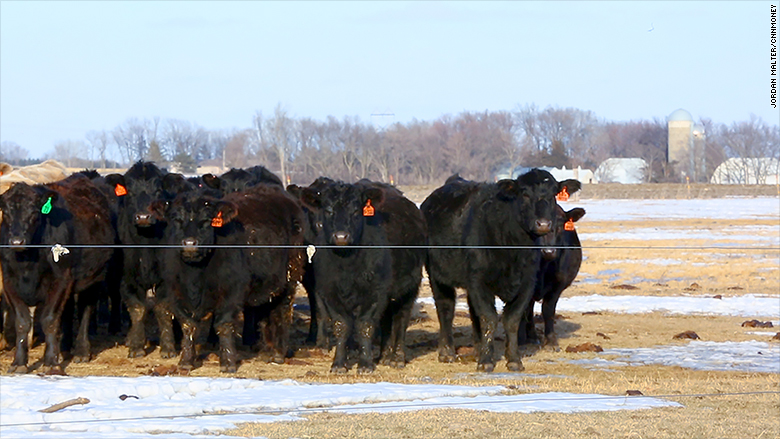
More than 6,000 medical trainees from foreign countries register each year in American residence programs through J-1 VISAS. According to the American Association of Medical Colleges, around 1,000 of these trainees come from countries in the prohibition. J-1 visa holders who were outside the country when the prohibition entered into force was prohibited from entering the United States and not starting or finishing school as long as the ban is in place.
The State Department declared to Cnnmoney that the government can issue J-1 visas to the people who are from the countries blocked if they are “of national interest”, but would not confirm if a shortage of doctor qualify for such consideration.
“The stress and concern generated by the short-term decree could have long-term implications, with fewer doctors choosing training programs in the United States and magnifying the deficit in suppliers arranged in poorly served and rural areas,” said Dr. Larry Dial, vice-dean for clinical affairs at the School of Medicine of the University of Marshall Virginie-Western.
Related: Obamacare impact on this city in Alaska with a single doctor's office
Al Nofal went to the school of medicine in Damascus, the capital of Syria, and ended his residence at the University of Texas with a J-1 visa. He went to a scholarship at the Mayo clinic, then asked for a D-1 derogation, which placed him in Sioux Falls.
Nineteen months after his three-year commitment, Al Nofal treats or serves directly as a Consultant doctor to more than 400 pediatric patients per month on average.
He sees most of his patients at the Sanford Children's Specialty Clinic in Sioux Falls, where families often drive for an appointment. Once a month, he steals on a small plane to see patients in a clinic in Aberdeen, about 200 miles away.
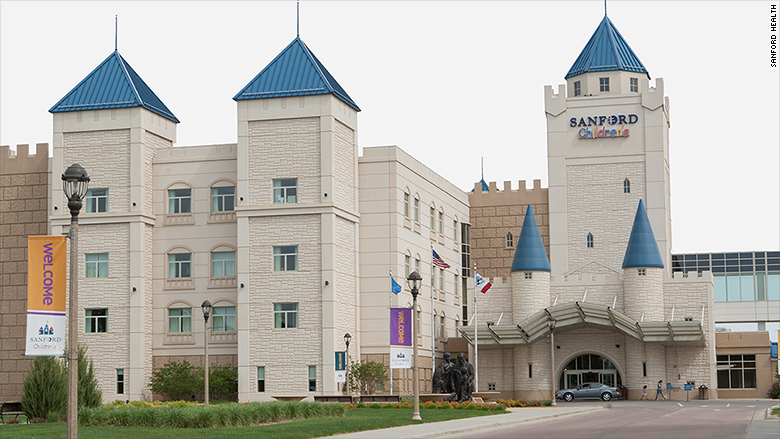
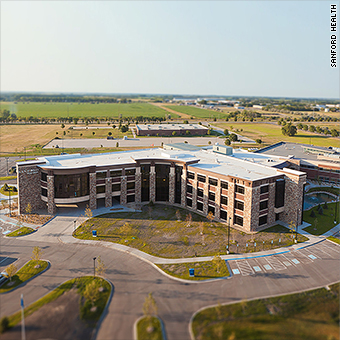
“It is not easy to be a doctor in this context,” said Al Nofal, citing long hours and the famous glacial winters of southern Dakota. “But as a doctor, I am trained to help people whatever the circumstances and I am proud of it.”
This is one of the reasons why Al Nofal and his American wife Alyssa had trouble reconciling with the Visa Ban.
“I have a 10 month old baby and I can't travel to Syria now. My family in Syria cannot come here,” he said. “Now my family cannot meet their first grandson.”
“I know that if we leave, I will probably never be able to come back,” he said. He also doesn't want to travel anywhere in the country right now. “I'm afraid of how I will be treated,” he said. He is also afraid of being arrested at the airport – even if he goes to another state.
Related: Trump Travel Ban and what you need to know
AlmatMed Abdelsalam, who is of Benghazi, in Libya, had planned to start practicing as a family doctor in Macon, Georgia, through the visa derogation program after completing his residence at the College of Medicine at the University of Florida Centrale in July.
Everything was going well. Abdelsalam, who treats hospital patients and veterans, asked for the Visa renunciation and was accepted. He signed an employment contract with Magna Care, who provides doctors with three hospitals in the Macon region and he had started watching houses to move, his wife and their two young children during the summer.
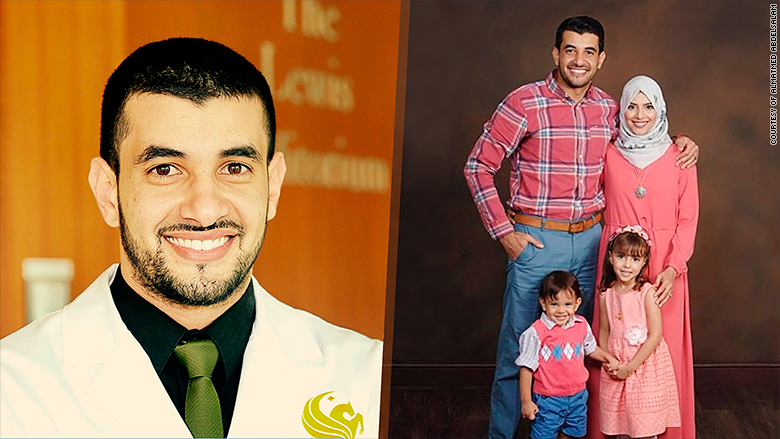
But there was one last step. In order for her request for derogation to J-1 to be complete, she must obtain the final approval of the State Department and the Citizenship and Immigration Services of the United States.
“The decree came in the middle of this process, blocking my request to the State Department,” he said.
Because he is a Libyan citizen (Libya is also subject to the prohibition of visa), Abdelsalam is afraid of the result.
“Macon hospital needs urgent doctors. Even if they have hired me, I don't know how long they can expect me,” he said.
“No one can say that it is necessary to keep the country safe, but we must also keep the country healthy,” he said. “Doctors like me, trained in the United States in some of the best schools, are an asset not a passive.”
CNNMONEY (New York) First advertisement on February 10, 2017: 19:47 pm HE




